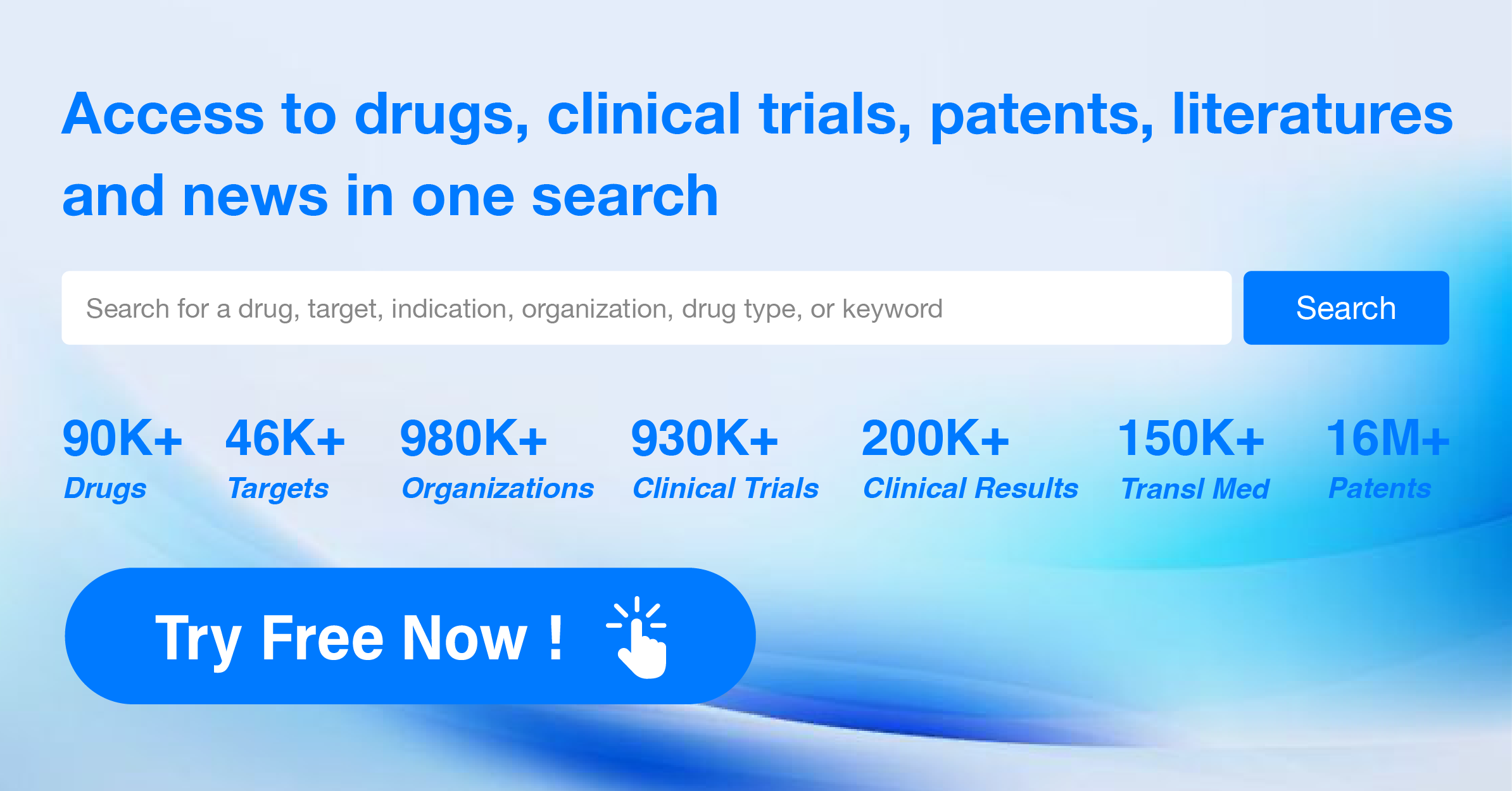Pharma Frontiers: Daily Digest of Global Pharmaceutical News – Jul 4
1.FDA Approves Eli Lilly's Alzheimer's Treatment Donanemab
On July 3rd, the U.S. FDA approved Eli Lilly and Company's Kisunla (donanemab) for the treatment of adults with early symptomatic Alzheimer's disease (AD). This includes patients with mild cognitive impairment (MCI) and those in the early stages of mild dementia whose condition is confirmed to be associated with amyloid pathology. The approval is based on the results from the TRAILBLAZER-ALZ 2 trial. According to data released by Eli Lilly at the 2023 Alzheimer’s Association International Conference (AAIC), donanemab significantly slowed cognitive and functional decline, and delayed the progression of disease in patients with early symptoms of Alzheimer's. Subgroup analysis demonstrated that participants in the earliest stages of the disease benefited the most, showing a 60% reduction in cognitive and functional decline compared to those receiving a placebo. Further analysis indicated that patients below 75 years of age benefited more from treatment with donanemab. At 18 months, donanemab treatment resulted in an average reduction of 84% in amyloid plaques across all participants, compared to just 1% in the placebo group. Patients could discontinue donanemab once they reached a predetermined threshold of amyloid plaque clearance, with about half achieving this threshold at 12 months and approximately 7 in 10 participants reaching it by 18 months. In terms of safety, the incidence of amyloid-related imaging abnormalities (ARIA) in this phase 3 clinical trial was similar to that observed in previous studies. ARIA, an adverse reaction associated with amyloid plaque-clearing antibody therapies, typically manifests as temporary swelling (ARIA-E) or microhemorrhages (ARIA-H) in one or more brain regions, detectable via Magnetic Resonance Imaging (MRI).
2.Sanofi and Regeneron Announce Approval of Dupilumab for COPD in the European Union
On July 3, Sanofi and Regeneron jointly announced that dupilumab (brand name: Dupixent) has been approved by the European Medicines Agency (EMA) as an add-on maintenance treatment for patients with chronic obstructive pulmonary disease (COPD) characterized by elevated levels of blood eosinophils and who remain uncontrolled. This includes patients already receiving combined treatment with inhaled corticosteroids (ICS), long-acting β2 agonists (LABA), and long-acting muscarinic antagonists (LAMA). The positive outcomes of the BOREAS and NOTUS studies were pivotal for this approval. BOREAS study (n=939) results revealed that the dupilumab group experienced a 30% reduction in the frequency of moderate-to-severe COPD exacerbations over 52 weeks (0.78 vs. 1.10, p<0.001). Additionally, at week 12, the dupilumab group showed a 160 mL increase in forced expiratory volume in one second (FEV1) from baseline, compared to a 77 mL increase in the placebo group (least squares mean difference of 83 mL, p<0.001). NOTUS study (n=935) outcomes showed a 34% decrease in the frequency of moderate-to-severe COPD exacerbations within 52 weeks for the dupilumab group (0.86 vs. 1.30, p<0.001). Concurrently, at week 12, the FEV1 increase from baseline was 139 mL for the dupilumab group, versus 57 mL for the placebo group (least squares mean difference of 82 mL, p<0.001). Previously, the FDA required additional analyses of efficacy data from the Phase III BOREAS and NOTUS studies for dupilumab, thereby extending the sBLA's PDUFA date in the United States from its original scheduled date of June 27, 2024, to September 27, 2024. Sanofi and Regeneron had submitted the additional analyses requested by the FDA in early May this year.
3.Vertex's New Generation Small Molecule Combination Therapy Marketing Authorization Application Accepted by FDA and EMA
On July 3rd, Vertex Pharmaceuticals announced that the U.S. FDA has accepted its New Drug Application (NDA) for the once-daily triple combination therapy vanzacaftor/tezacaftor/deutivacaftor (vanza triple therapy) for the treatment of cystic fibrosis (CF) in patients aged 6 years and older who have at least one F508del mutation or another responsive mutation in the cystic fibrosis transmembrane conductance regulator (CFTR) gene. Patients with these mutations respond to vanza triple therapy. Vertex utilized a priority review voucher for this application, with a target PDUFA date of January 2, 2025. Additionally, the European Medicines Agency (EMA) has completed the validation of Vertex’s Marketing Authorization Application (MAA) for this therapy for CF patients aged 6 years and above in the European Union. Vertex has also submitted regulatory applications in Canada, Australia, Switzerland, and the United Kingdom. Data shows that vanza triple therapy has achieved positive results in three Phase 3 clinical trials. In the randomized, double-blind Phase 3 clinical trials named SKYUM\SKYLINE 102 and SKYLINE 103, which included an active comparator, patients first received 4 weeks of initial treatment with the approved therapy Trikafta to establish baseline values of predictive percent predicted FEV1 (ppFEV1), sweat chloride (SwCl), and other efficacy parameters. Subsequently, patients were randomized to receive either Trikafta or vanza triple therapy. Trial results indicated that after 24 weeks of treatment, based on ppFEV1 assessments, the efficacy of vanza triple therapy met the primary endpoint and was comparable to that of the active comparator drug. Moreover, vanza triple therapy demonstrated superiority in reducing SwCl levels, achieving the first key secondary endpoint in SKYLINE 102 and SKYLINE 103.
4.Johnson & Johnson/Legend Biotech CAR-T Therapy Phase 3 Positive Results Announced
On July 3rd, Johnson & Johnson and Legend Biotech jointly announced the positive results from the planned second interim analysis of the Phase 3 CARTITUDE-4 study, which evaluated their jointly developed chimeric antigen receptor (CAR) T-cell therapy, Carvykti (ciltacabtagene autoleucel, cilta-cel), in comparison to standard treatments for patients with relapsed or refractory multiple myeloma (MM) who are resistant to first-line therapy with lenalidomide. The interim analysis indicated a statistically significant and clinically meaningful improvement in overall survival (OS) for patients treated with Carvykti compared to those receiving standard therapies. Detailed data will be presented at an upcoming medical conference and submitted to global regulatory authorities. According to the press release, Carvykti is the first BCMA-targeted CAR-T therapy approved for the treatment of multiple myeloma in patients who have received at least one prior therapy.
The CARTITUDE-4 study is an international, randomized, open-label Phase 3 trial designed to assess the efficacy and safety of Carvykti versus standard treatment regimens in adult patients with lenalidomide-refractory, relapsed MM who have previously undergone 1-3 lines of therapy. The standard treatment arms in the study include Pomalidomide, Bortezomib, and Dexamethasone (PVd) or Daratumumab, Pomalidomide, and Dexamethasone (DPd). Previous results from the trial indicated that, according to an Independent Review Committee (IRC) assessment, patients treated with Carvykti demonstrated a statistically significant improvement in progression-free survival (PFS) compared to those treated with standard therapies (HR=0.41, 95% CI: 0.30-0.56, p<0.0001).
5.Fulian Pharmaceutical’s Radioligand Therapy Granted FDA Fast Track Designation
On July 3, Fulian Pharmaceutical announced that its lead radiopharmaceutical, 225Ac-FL-020, has been granted Fast Track designation by the FDA. This drug targets the Prostate-Specific Membrane Antigen (PSMA) and is developed for the treatment of metastatic castration-resistant prostate cancer (mCRPC). 225Ac-FL-020 is an innovative next-generation PSMA-targeted radioligand therapeutic (RDC) being developed by Fulian Pharmaceutical. This drug is intended for the treatment of mCRPC and is set to enter global Phase 1 clinical trials in 2024. The target carrier FL-020, utilized in the drug, was developed using Fulian Pharmaceutical’s proprietary UniRDC™ platform, which significantly enhances drug uptake efficiency at tumor sites while ensuring rapid systemic clearance. In preclinical models, 225Ac-FL-020 demonstrated promising antitumor effects and good safety profiles. Furthermore, according to a Fulian Pharmaceutical press release, 225Ac-FL-020 employs targeted alpha therapy, enabling precise targeting of cancer cells and minimizing damage to healthy tissue. In preclinical models, the radiolabeled FL-020 exhibited excellent in vivo distribution properties, including high-level and sustained tumor uptake as well as rapid systemic clearance. In the LNCaP xenograft mouse model, 225Ac-FL-020 showed favorable antitumor activity and excellent safety. The initiated Phase 1 clinical trial will thoroughly evaluate the safety and tolerability of 225Ac-FL-020, and further explore its antitumor activity. Prior to this, 225Ac-FL-020 had received FDA approval for a new drug clinical trial (IND) in May 2024.
6.Henlius Biotech's Anti-PD-1 Monoclonal Antibody Approved for Phase 3 Clinical Trials in Japan
On July 2nd, Henlius Biotech announced that its product, serplulimab injection, received approval from the Pharmaceuticals and Medical Devices Agency (PMDA) in Japan to conduct an international multicenter phase 3 clinical trial. This study aims to assess the efficacy and safety of serplulimab injection in combination with bevacizumab injection and chemotherapy as a first-line treatment for metastatic colorectal cancer. Serplulimab, a novel anti-PD-1 monoclonal antibody developed independently by Henlius Biotech, was approved by China's National Medical Products Administration (NMPA) in March 2022. Currently, serplulimab has been approved for four indications in China: 1) for the treatment of adult patients with advanced solid tumors that are microsatellite instability-high (MSI-H) and have failed standard therapy; 2) in combination with carboplatin and albumin-bound paclitaxel for the first-line treatment of unresectable locally advanced or metastatic squamous non-small cell lung cancer; 3) in combination with carboplatin and etoposide for the first-line treatment of extensive-stage small cell lung cancer; 4) in combination with fluoropyrimidine and platinum-containing drugs for the first-line treatment of unresectable locally advanced/recurrent or metastatic esophageal squamous cell carcinoma with PD-L1 positivity. Additionally, the fifth indication for serplulimab, intended for the first-line treatment of non-squamous non-small cell lung cancer, has been accepted by the NMPa. Internationally, serplulimab has been approved by the Indonesian Food and Drug Administration (BPOM) for the treatment of extensive-stage small cell lung cancer; its marketing authorization application in the European Union has been accepted by the European Medicines Agency (EMA); furthermore, bridge trials in the United States are progressing.
7.NeuShen Therapeutics' Small Molecule Conformer New Drug NS-136 Approved for Clinical Trials
On July 2nd, the official website of China's Center for Drug Evaluation (CDE) under the National Medical Products Administration announced that NeuShen Therapeutics' class 1 new drug NS-136 tablets have been approved for clinical trials, intended for the treatment of schizophrenia. According to public information released by NeuShen Therapeutics, NS-136 is a novel, selective muscarinic acetylcholine M4 receptor positive allosteric modulator (M4 PAM). Prior to this approval, the drug had already commenced Phase I clinical studies in Australia. Schizophrenia is a highly disabling mental disorder that affects at least about 1% of the global population. Clinical characteristics of schizophrenia include positive symptoms (hallucinations, delusions), negative symptoms (emotional flatness, social dysfunction), and cognitive impairments. While there are existing clinical drugs to treat the positive symptoms, effective treatment options for the long-term social functioning and quality of life impairments due to negative symptoms and cognitive issues are still lacking. NeuShen Therapeutics' previous press releases note that positive modulation of the M4 receptor represents a new mechanism of action in schizophrenia treatment, particularly in improving negative symptoms and cognitive impairments, which is considered an important advancement in the treatment of schizophrenia and has garnered widespread attention. This target also shows considerable potential in treating psychiatric symptoms associated with Alzheimer's disease or Parkinson's disease. NS-136 is a novel, highly selective M4 PAM developed on NeuShen Therapeutics’ own small molecule drug development platform. It has demonstrated good in vitro activity and therapeutic effects on both positive and negative symptoms in disease animal models, with differentiated drug-like properties. Public information reveals that NeuShen Therapeutics is a clinical-stage international biotechnology company that employs a dual-platform strategy based on small molecule discovery and AAV-based gene therapies, specializing in the R&D of innovative medications and treatments for neurological and psychiatric disorders.
8.Lannacheng Biotechnology Secures Another Clinical Approval in the US for Its Antitumor Radioactive Drug
On July 2nd, Dongcheng Biochemicals announced that its subsidiary, Lannacheng Biotechnology, has received FDA approval for clinical trials in the United States for its 177Lu-LNC1011 injection. The Phase 1 clinical trials are set to commence shortly. This radioactive in vivo therapeutic agent targets the Prostate-Specific Membrane Antigen (PSMA) and is intended for the treatment of patients with advanced prostate cancer expressing PSMA positivity. It is noteworthy that this is another PSMA-targeted radioactive in vivo therapy from Lannacheng to receive clinical approval in the US, following the approval of 177Lu-LNC1003 injection.
PSMA is a type II glutamate carboxypeptidase secreted by prostate epithelial cells. Research indicates that PSMA is overexpressed on the surface of more than 90% of prostate cancer cells (100 to 1000 times higher than in normal prostate cells) and even higher in patients with advanced and castration-resistant prostate cancer. Additionally, PSMA is highly expressed in the neovascular endothelial cells of various tumors, making it a significant focus in the field of targeted cancer therapy.
According to a press release from Dongcheng Biochemicals, the 177Lu-LNC1011 injection has shown high binding affinity and PSMA targeting specificity in both in vivo and in vitro studies, allowing the radioactive nuclide to concentrate at the tumor site for precise cancer treatment. Results from investigator-initiated trials (IIT) indicate that the drug is well-tolerated by subjects, has high safety, exhibits lower uptake in salivary glands, and achieves a high absorbed dose in tumors.
9.CStone Pharmaceuticals and Hengrui Pharmaceuticals have reached a commercialization collaboration for a cancer drug
On July 3rd, CStone Pharmaceuticals announced an agreement with Hengrui Pharmaceuticals, granting Hengrui the exclusive rights to promote the precision therapeutic drug Avapritinib in Mainland China. CStone Pharmaceuticals will continue to hold the rights for research, registration, production, and distribution of Avapritinib tablets in Mainland China. According to the terms of the agreement, CStone Pharmaceuticals will receive an initial payment of 35 million RMB, and Hengrui Pharmaceuticals will subsequently pay a service fee to CStone. Avapritinib is a potent, highly selective, oral kinase inhibitor targeting mutations in KIT and PDGFRA. It was approved by the National Medical Products Administration (NMPA) in March 2021 for the treatment of adult patients with unresectable or metastatic gastrointestinal stromal tumors (GIST) harboring a PDGFRA exon 18 mutation, including the PDGFRA D842V mutation. This product was developed in collaboration with Blueprint Medicines. In 2018, CStone Pharmaceuticals and Blueprint Medicines entered into an exclusive collaboration and licensing agreement, securing exclusive rights for the development and commercialization of Avapritinib in the Greater China region, which includes Mainland China, Hong Kong, Macau, and Taiwan. In the United States, Avapritinib has received FDA approval for the treatment of three indications: adult patients with unresectable or metastatic GIST carrying a PDGFRA exon 18 mutation, including the PDGFRA D842V mutation; adult patients with advanced systemic mastocytosis (SM), SM associated with a hematologic neoplasm (SM-AHN), mast cell leukemia (MCL), and indolent systemic mastocytosis (ISM).
How to obtain the latest research advancements in the field of biopharmaceuticals?
In the Synapse database, you can keep abreast of the latest research and development advances in drugs, targets, indications, organizations, etc., anywhere and anytime, on a daily or weekly basis. Click on the image below to embark on a brand new journey of drug discovery!




